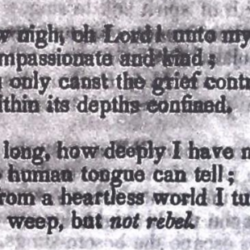Contributor(s): Shared on: 26 October 2021 under the Creative Commons Zero (CC 0) Universal license a Public Domain dedication Categories: Tags: | Contribute a translation | Source (English) |
|---|
|
Oh! thou in whom the power dwells,
To heal or wound, to save or slay;
Whose hand alone the mandate seals,
That hastens or arrests decay;
Let me with pious fortitude,
Thy dispensations justify;
And in each great vicissitude,
With perfect faith on thee rely. | |
Oh! ye who have consigned to dust,
Some darling object of your care;
Fail not in heaven still to trust,
Whose mercy will your loss repair;
Nor let the bitter cup in vain,
Be tendered to your trembling lips;
For God, with beneficial pain,
Thus of its pride the spirit strips. | |
Mortals presume to call their own,
Blessings vouchsafed by grace divine;
Not as a gift but as a loan,
Father! will I consider mine.
And when thou wiliest to recall,
All that on earth I love the best;
Before thy footstool will I fall,
And bow to thy supreme behest. | |
The messengers of Death, surround
Alike, the palace and the cot;
Nor king, nor vassal can be found,
Who shall escape the common lot.
Let mighty conquerors declare,
If they can with disease contend;
Nor in their final struggle, share
The pangs, that meaner bosoms rend. | |
Pilgrims, whose aggregate of days,
With vast eternity compared,
But as a fleeting moment weighs,
For the last hour be prepared!
Wrestle with sin, watch, worship, praise
And glorify the Lord your God!
Who shall to life eternal raise,
The saints that sleep beneath the sod. |
“Oh! thou in whom the power dwells,” by Penina Moïse, published in 1842, appears under the subject “Submission to the Will of God” as Hymn 36 in Hymns Written for the Service of the Hebrew Congregation Beth Elohim, South Carolina (Penina Moïse et al., Ḳ.Ḳ. Beth Elohim, 1842), pp. 39-40. –Aharon Varady Source(s)
 Ḳahal Ḳadosh Beth Elohim (Hebrew: קהל קדוש בית אלהים, also known as Ḳ.Ḳ. Beth Elohim, or more simply Congregation Beth Elohim), founded in 1749 in Charleston, South Carolina, is one of the oldest Jewish congregations in the United States. The founding members of the synagogue were Jews of Spanish and Portuguese descent (Sepharadim), who arrived into Charleston via London, England. Before 1830 Ḳahal Ḳadosh Beth Elohim was a place of worship for Spanish and Portuguese Jews using Portuguese rituals as done in Portugal before the Spanish and Portuguese inquisitions. A splinter group animated by the European Reform movement, the Reformed Society of Israelites, formed in 1824. While at first this group did not succeed in reforming Beth Elohim, by the mid 1830s Beth Elohim had reabsorbed its members and its ḥazzan, Gustavus Poznanski (1804–1879), joined the Reform camp in 1840. After the first synagogue building was destroyed by fire in 1838, it was rebuilt two years afterward (in a Greek Revival style designed by Cyrus L. Warner) with an organ to the chagrin of the traditionalists. Ḳahal Ḳadosh Beth Elohim is recognized as the oldest Reform Jewish congregation in the Americas.  Penina Moïse (1797-1880) was born to a large and wealthy family in Charleston, South Carolina, the progeny of her merchant father, Abraham Moïse (1736-1809), originally from Strasbourg in Alsace, France, and her mother Sarah from the Jewish community on the Caribbean island of Sint Eustatius in the Netherlands Antilles. Her brother, also named Abraham, was a leader in the Reformed Society of Israelites, and so we imagine she was closely associated with the reformist wing of the congregation it wished to and ultimately succeeded in reforming, Ḳ.Ḳ. Beth Elohim. Moïse wrote at least 187 prayers for Beth Elohim's hymn books published in 1842 and in 1856. Moïse was also a gifted teacher and, in 1845, became head of Beth Elohim’s religious school. Moïse was a prolific writer, earning praise for her 1833 collection of poems, Fancy’s Sketch Book, as well as her articles for various newspapers across the country. After the Civil War, she returned to Charleston and ran an academy with her sister and niece. Though her eyesight eventually deteriorated into blindness, she continued to work and write until the end of her life. (This short biographical sketch includes material adapted from her entry in the Jewish Women's Archive by Jay M. Eidelman.) Aharon Varady (M.A.J.Ed./JTSA Davidson) is a volunteer transcriber for the Open Siddur Project. If you find any mistakes in his transcriptions, please let him know. Shgiyot mi yavin; Ministarot naqeni שְׁגִיאוֹת מִי־יָבִין; מִנִּסְתָּרוֹת נַקֵּנִי "Who can know all one's flaws? From hidden errors, correct me" (Psalms 19:13). If you'd like to directly support his work, please consider donating via his Patreon account. (Varady also translates prayers and contributes his own original work besides serving as the primary shammes of the Open Siddur Project and its website, opensiddur.org.) Read a comment / Leave a comment (moderated) Works of related interest: |












Leave a Reply